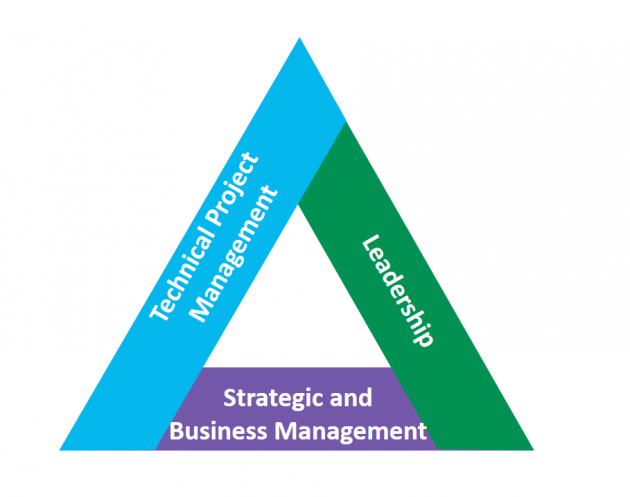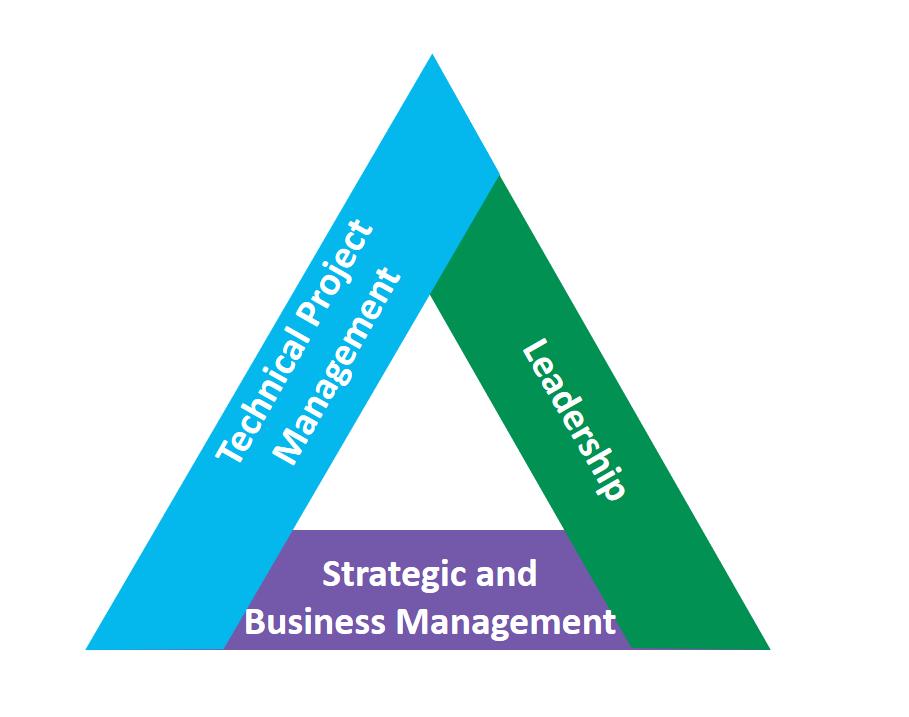The triangle of talent, not just a simple shape, but the golden triangle of the Project Manager.
Would you like to know more? I will try to explain it to you.
Let’s briefly think about what are the most important qualities for a successful project manager.
Everybody, both those who have worked for years in this world, as well as those who have just started, will certainly report the qualities of the project manager that are in line with what we will see in shortly.
CONTENT INDEX
Considering the many skills, talents and competencies required for this role, it is clear that project management requires many qualities and skills.
And in order not to leave any doubt, the Project Management Institute (PMI) outlined the ideal set of skills of a project manager in a model called the “Triangle of Talent“.
This model synthetically analyzes the art of project management in the three categories we will now see.
Let’s find out what skills make a project manager, a successful figure.
The three sides of the Triangle of Talent

The Triangle of Talents contains the ideal set of skills for project managers.
Its three sides include the following skills:
- Technical skill;
- Leadership;
- Business strategic management.
The beauty and charm of the Triangle of Talents lie in the combination of skills, elements of business management with technical skills in project management, and human and social skills.
The most successful project managers use all three of these areas in order to grow in their work.
The first side of the Triangle of Talents: Technical skill
A project manager could not excel in his work without the technical know-how of the sector in which he operates.
This includes not only the specific skills of project management, but also the knowledge of the industry in general.
Proper technical skills and knowledge are in fact fundamental to successfully complete the project.
A project manager needs to know how to calculate the so-called earned value, how to manage costs, how to do a risk analysis, etc.
The PMI outlines some of the specific technical skills that the project manager should possess, including:
- Agile practices;
- Earned value management;
- Project life cycle management;
- Management of project requirements;
- Schedule management;
- Time, budget, cost estimate;
- Data collection and analysis;
- Governance;
- Performance management;
- Risk management;
- Scope management.
As previously said, a successful project manager needs a solid understanding of the industry in which he operates.
In fact, the daily work of a PM can vary depending on the sector in which he works.
If he does not know the environment surrounding a project, he will have difficulties in understanding any problems and in finding solutions.
Moreover, due to lack of technical experience, the project manager may lose the respect of the members of the team.
In short, the lack of technical knowledge could lead to problems related to the understanding of project details and technical problems.
Both of these factors could jeopardize the future of the project.
Technical knowledge, commonly known as “hard skills“, can be learned, studied and refreshed through training courses, seminars, webinars, etc …
This side of the Triangle of Talents certainly represents the most concrete and easy to learn quality, but in order to have it, dedication is certainly necessary.
The second side of the Triangle of Talents: Leadership
The second core competency of the PMI‘s Triangle of Talents is leadership.
A successful project manager must guide his team – or more teams – through all phases and processes of the project.
Leadership can have different forms.

Leadership expertise includes coaching and mentoring, influence on employees and stakeholders, team building and brainstorming, interpersonal skills and negotiation.
Even problem solving and conflict management are included into the leadership skills.
Project managers must guide teams towards project completion, inspiring and motivating people to continue throughout the process.
Because using leadership means
TO WIN AS A TEAM, NOT AS AN INDIVIDUAL
As an effective leader, a project manager must inspire team members about the future and offer them a vision that will help them achieve the goal.
As a leader of an effective team, a project manager must be proactive and a problem solver.
The successful project manager must have motivating qualities. At the beginning of a project the motivation is usually high, and then gradually decreases.
Here, in fact, the manager’s motivation capacity is essencial.
Motivating the team is certainly hard and complex, but essential for the good success of the project.
A project manager should also have management and delegation skills that enable him to do his job in the best way and with the right support.
He must be able to understand who to entrust with a particular responsibility or particular task, and who is not the right person.
Moreover, ensuring that the team members possess the skills required to successfully complete the work is also part of the skills of this project leader.
If skills are lacked, the project management will give the necessary training or, in general, will allow the collaborators to receive it.
The third side of the Triangle of Talents: Business Strategic Management
The third side of this magic triangle is as important as the other two.
Business strategic management makes it possible to carry out an analysis of company decisions before implementing them.
Project managers not only apply their knowledge and leadership qualities, but must also align projects with business goals.
This third side of the PMI’s Triangle of Talents includes the following skills and competences:
- Competitive analysis;
- Legal and regulatory compliance;
- Operational functions, such as finance, marketing, ecc;
- Business Acumen;
- Customer service and satisfaction;
- Awareness of the market, its conditions and its trend.
Understanding the purpose of the project and the way it supports the organization’s overall goals enable project managers to be able to drive their teams to success.
These professionals must understand what the organization is trying to achieve in general and how the specific project fits into this general vision.
This helps the organization achieve its long-term goals.
The first step towards success is found in the confirmation and acceptance of the strategic business plan by all the stakeholders.
In conclusion
As any successful project manager can state, the mixture and the right balance of skills and qualities make this figure a complete and successful professional.
That is why the Triangle of Talents works.
In today’s dynamic environment, a project manager must be versatile.
Having just one skill is not enough.
The balance of the three sides of the Triangle of Talents is not just about the possession of complementary skills.
These are all the critical areas that a project manager must master in order to succeed in his career.
The technical skills of project management help to perform specific functions or tasks, leadership skills help to achieve business goals within the organization and strategic business management helps to achieve better overall business results.
So, this is the ideal recipe for a successful project manager.
Do you agree with what the Triangle of Talents expresses?
Do you think there are other qualities that deserve to be mentioned?
Leave us your comment.




